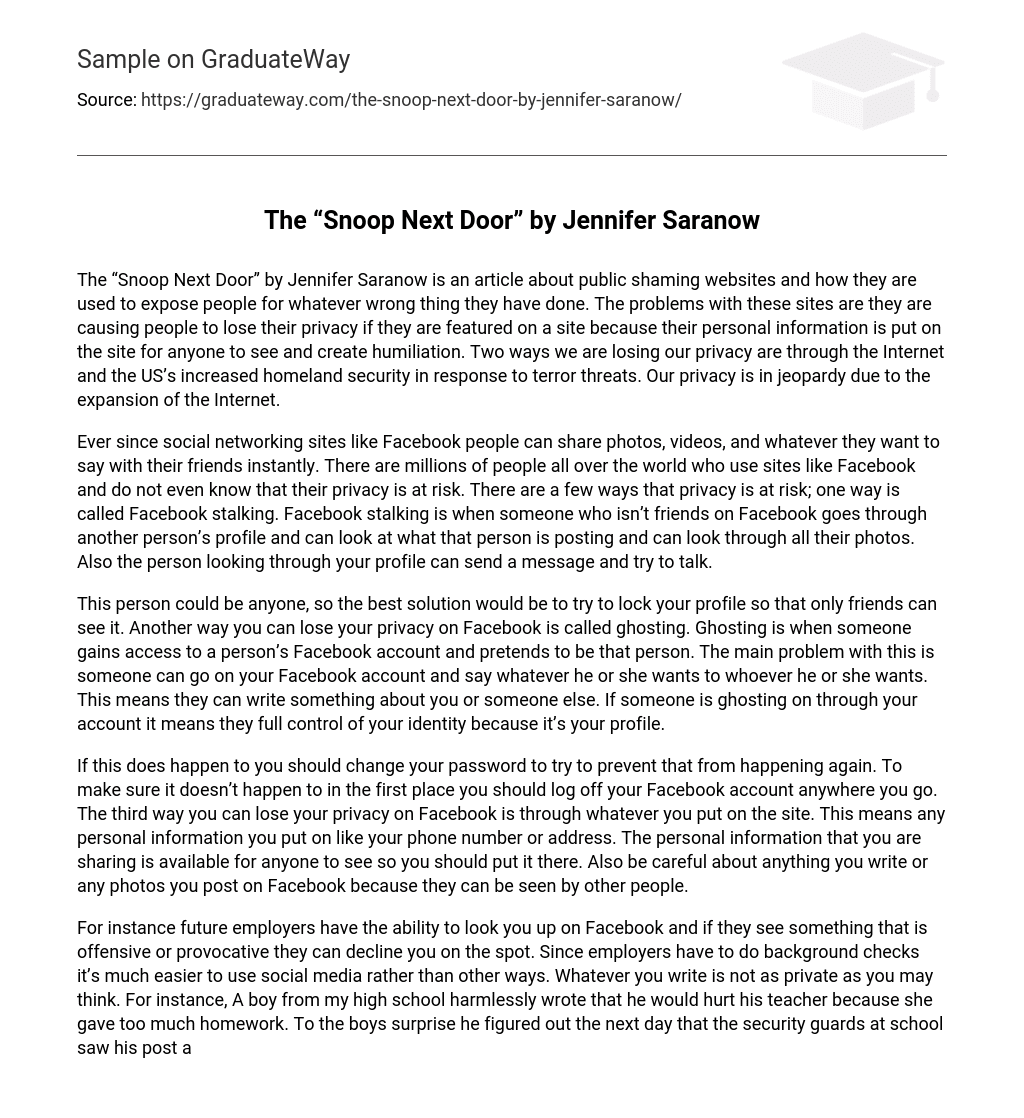The “Snoop Next Door” by Jennifer Saranow is an article about public shaming websites and how they are used to expose people for whatever wrong thing they have done. The problems with these sites are they are causing people to lose their privacy if they are featured on a site because their personal information is put on the site for anyone to see and create humiliation. Two ways we are losing our privacy are through the Internet and the US’s increased homeland security in response to terror threats. Our privacy is in jeopardy due to the expansion of the Internet.
Ever since social networking sites like Facebook people can share photos, videos, and whatever they want to say with their friends instantly. There are millions of people all over the world who use sites like Facebook and do not even know that their privacy is at risk. There are a few ways that privacy is at risk; one way is called Facebook stalking. Facebook stalking is when someone who isn’t friends on Facebook goes through another person’s profile and can look at what that person is posting and can look through all their photos. Also the person looking through your profile can send a message and try to talk.
This person could be anyone, so the best solution would be to try to lock your profile so that only friends can see it. Another way you can lose your privacy on Facebook is called ghosting. Ghosting is when someone gains access to a person’s Facebook account and pretends to be that person. The main problem with this is someone can go on your Facebook account and say whatever he or she wants to whoever he or she wants. This means they can write something about you or someone else. If someone is ghosting on through your account it means they full control of your identity because it’s your profile.
If this does happen to you should change your password to try to prevent that from happening again. To make sure it doesn’t happen to in the first place you should log off your Facebook account anywhere you go. The third way you can lose your privacy on Facebook is through whatever you put on the site. This means any personal information you put on like your phone number or address. The personal information that you are sharing is available for anyone to see so you should put it there. Also be careful about anything you write or any photos you post on Facebook because they can be seen by other people.
For instance future employers have the ability to look you up on Facebook and if they see something that is offensive or provocative they can decline you on the spot. Since employers have to do background checks it’s much easier to use social media rather than other ways. Whatever you write is not as private as you may think. For instance, A boy from my high school harmlessly wrote that he would hurt his teacher because she gave too much homework. To the boys surprise he figured out the next day that the security guards at school saw his post and told him that he was suspended for 10 days because they said it was considered a threat.
This example really shows how whatever you post on Facebook isn’t really private. In response to the events of September 11, our privacy has been threatened in order to keep our country safe. On September 11, 2001 terrorists hijacked and crashed four planes in NY, PA and DC killing over 2000 people. The US’s response to these terrorist attacks was passing the Patriot Act which basically means increased surveillance and fewer restrictions when investigating terrorism.
Though this act was put in place to keep the county safe from terror threats, it also violates human liberties in the process. One result of increased surveillance is phone tapping. Phone tapping is when law enforcement can listen to your phone calls if they have any reason to suspect anything or just to keep an eye on you. This is an invasion of your privacy because it’s not a good feeling to know that someone is listening to whatever private things you have to say over the phone. Another result of heightened security is full scanners that are being used at airports across the country.
Since during 9/11, terrorist were able to smuggle weapons on board airplanes and the full body scanner can be used to see if anyone is trying to bring anything dangerous or illegal aboard an airliner. The problem with the full body scanner is it can be used to see through clothing making people feel uncomfortable with the idea. The last way that the increased surveillance has been affecting people’s privacy is Arizona Immigration Laws. The law basically states that law enforcement can pull over any driver they believe is an illegal immigrant and demand proof of citizenship.
Many people across the nation have shown their dislike to the law saying it is racist and an invasion of privacy. The article “The Snoop Next Door” deals with how the Internet is being used to expose and humiliate people that do bad things. While this may help to make sure things like that don’t happen again it directly invades the privacy of the person who is being exposed. After reading this essay about how the internet and increased homeland security can affect your privacy I hope you take steps in trying to protect the little privacy we have now.





